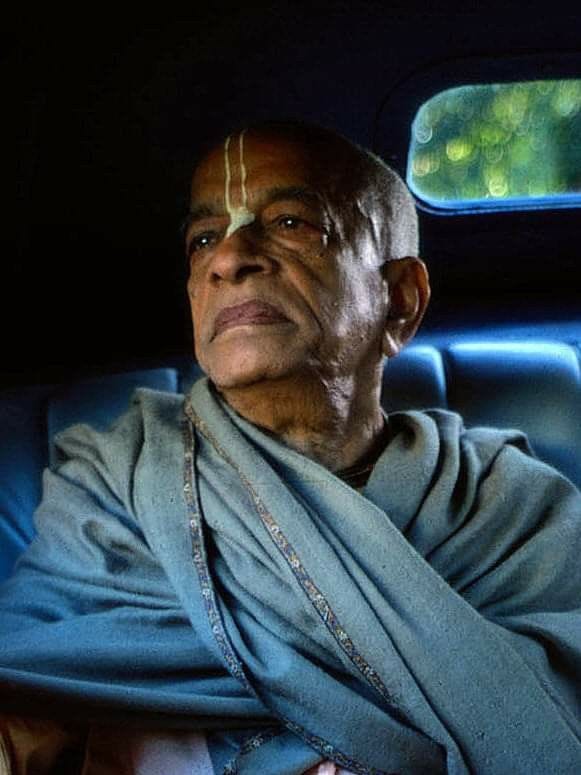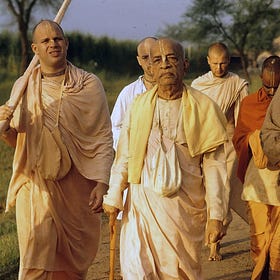Four classes of people according to Srila Prabhupada
Srila Prabhupada explains that there are four classes of people: 1- The lazy intelligent, 2- The active intelligent, 3- The lazy foolish, 4- The active foolish. How does it work?
Srila Prabhupada explains that there are four classes of people:
1- The lazy intelligent
2- The active intelligent
3- The lazy foolish
4- The active foolish
The lazy intelligent is intelligent and qualified, but being influenced by the mode of goodness, he is not very anxious to act. Instead, he calmly considers and plans before making every move. As a result, he doesn't waste his energy on unnecessary things and doesn't commit mistakes. All his actions yield the best possible results.
The active intelligent is influenced by the mode of passion. He is intelligent, but because he is very active, he does many unnecessary things, and sometimes he makes mistakes. However, because he is intelligent, his actions still give good results most of the time.
The lazy foolish is, well, foolish, and thus most of the time his actions don't result in very positive outcomes. However, because he is lazy, he doesn't do much harm.
The real problem is the active foolish. Not only does he do all kinds of nonsense, but because he is very active, he does a lot of harm.
In the varnāśrama institution, the lazy intelligent are the brāhmanas, who use their intelligence for guiding society in the direction of the ultimate goal. The active intelligent are the kṣatriyas and vaiśyas, who use their intelligence for bringing material prosperity to society. They are often blind to the real purpose of life, and often commit serious mistakes, but most of the time their actions are positive.
What about the other two classes?
The lazy foolish are the śūdras, who don't have much personal initiative but work under the guidance of the higher classes. They don't have the qualification to act in beneficial ways by themselves, but because they are not very active, they usually act only when guided by the higher classes. In this way, they are also positively engaged and rarely do any harm.
The problem is the active foolish. These are people outside the varnāśrama system, who not only show the explosive combination of lack of qualification and proper moral values but are also very active, creating a lot of harm.
Because they do a lot of harm and are not eager to accept instructions from the higher classes, this class of people would not be accepted in civilized societies and would thus be forced to live in the mountains and forests.
In modern societies, there is an abundance of the active foolish, and this results in the many problems we can observe, such as consumerism, environmental degradation, wars, and so on. We can't make them disappear, but we can work on ourselves so we don't become one more in the team.
The best is to be a lazy intelligent, situated in the mode of goodness and executing spiritual activities that can bring real benefit to society. If this is not possible, the next good choice is to be an active intelligent: organizing things, producing wealth, and bringing material prosperity to society. The problem is that for this we need the proper qualification. If we lack it, the best option is to be a lazy foolish, and act under the guidance of intelligent persons, avoiding activities that will result in harm for us and for others.
When we start in spiritual life, we are exactly in this position. We lack the proper qualification; therefore, when we act, we end up doing more harm than good most of the time. The solution is to act under the guidance of qualified devotees whom we trust until our spiritual realization grows and we accumulate the necessary qualifications to start making the right decisions by ourselves.
The most essential point is to avoid being an active foolish who just does harm. If we go on this path, we may end up being forced to live in the hills and forests, far away from devotees.
Read also:
The genius of Srila Prabhupada
There are many purports where Srila Prabhupada appears to go off-script and give an explanation that differs or sometimes even appears to contradict what the verse says. However, when we dive deep into the commentaries of previous acaryas, as well as other passages, we see that in reality, Prabhupada reveals the deeper meaning of the passages, which are usually very well hidden in the aphorisms of the text.
If you read this article to the end, give it a like. This makes Substack recommend it to more people.




Another great and practical article by Chaitanya Chandra!
The age of kali is infested with the lower class of human beings who are addicted to the four base acts of animal slaughter, speculation or misinterpretation of scripture, intoxication of the body and mind and abuse of the reproductive organs. No emphasis on self realisation and higher thinking is encouraged, but the four sinful acts are very much encouraged by political and religious leaders. Most unfortunate for the general citizens!!!